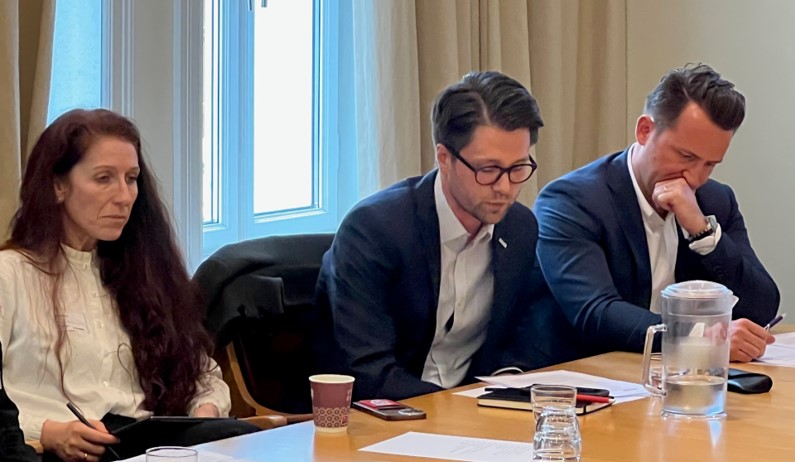Koalisjonen for sjeldne sykdommer takker for at Fremskrittspartiet velger å sette fokus på sjeldne sykdommer med dette innspillsmøtet. Jeg heter Fredrik Arneberg og er her sammen med Bjørn-Kristian Svendsrud på vegne av Koalisjonen for sjeldne sykdommer. «Det er noe vakkert i at et helt samfunn bryr seg om en liten gruppe mennesker». Dette var ordene fra Torstein Lerhol, SMA-pasient som har ventet altfor lenge på effektiv behandling, på gårsdagens Dagsrevyen.
Torstein og SMA-pasientenes kamp styrker koalisjonens oppfatning at dagens finansieringssystem ikke er bærekraftig, og at det først og fremst rammer pasienter med sjeldne sykdommer.
På vegne av Koalisjonen utarbeidet Menon Economics i fjor en rapport som finner at samfunnskostnadene knyttet til sjeldne diagnoser er 167 milliarder i året, til sammenligning er samfunnskostnadene for kreft 210 milliard. Sjeldne diagnoser legger beslag på store ressurser fra det offentlige og pårørende, og forhindrer mennesker med sjeldne diagnoser å delta i arbeidslivet.
I forbindelse med legemiddelmeldingen og prioriteringsmeldingen ble finansieringen av legemidler til sjeldne sykdommer flyttet fra folketrygden til de regionale helseforetakene tilbake i 2019. Samtidig ble det bestemt at all ny behandling skal metodevurderes og oppfylle prioriteringskriteriene. Dette har vist seg å gi utilsiktede konsekvenser, til tross for at Stortinget og komiteen har hatt andre, bedre intensjoner.
Erfaringen fra pasienter, pårørende, leger og legemiddelindustrien er at det er blitt vanskeligere for en allerede sårbar gruppe å få tilgang til nye og effektive behandlinger. Prioriteringsmeldingen slår altså uheldig ut for små pasientgrupper.
Fredrik Arneberg, Koalisjonen
Prioriteringsmeldingen legger et premiss om at usikkerhet om effekten skal telle negativt i beslutningsprosessen. Mindre usikkerhet kan man få ved å rekruttere flere pasienter til de kliniske studiene. Det lar seg per definisjon ikke gjøre, fordi det er få pasienter å ta av. Komiteen merket at det skulle stilles andre krav til studiedata for sjeldne sykdommer. Likevel er det i Legemiddelverkets retningslinjer de samme vilkårene til dokumentasjon for sjeldne sykdommer som for andre sykdommer. De fleste beslutninger i Beslutningsforum ender med en beslutning om å ikke innføre legemiddelet med begrunnelsen «dokumentasjonen for effekten er for usikker i forhold til prisen».
Dette medfører ofte at norske pasienter må vente til at nye data blir generert i land som evner å ta ny behandling i bruk og blir «straffet» på grunn av forhold som ligger utenfor deres makt.

Prioriteringsmeldingen, Nye Metoder og metodevurderinger har hatt en særlig negativ effekt på opptaket av nye, innovative legemidler til behandling av sjeldne sykdommer. Tre hovedutfordringer med systemet for sjeldne sykdommer er:
- Det benyttes et måleverktøy for livskvalitet som ikke passer sjeldne sykdommer. For eksempel måler det ikke at du bare trenger halvparten så mye pustehjelp som du gjorde før du fikk legemiddelet.
- Betalingsvilligheten er stigende frem til pasientene har «vunnet» 20 gode leveår, men pasienter som «vinner» 60 eller 70 gode leveår i stedet skal ikke det telle mer positivt enn vanligere sykdommer.
- Til slutt reduseres effekten, fordi Stortinget har gitt sin tilslutning til at et godt år du får 40 år frem i tid er mindre verdt enn året du får i dag.
Dette er eksempler på at systemet innretter seg for de store, men «mindre» alvorlige sykdommer, som dessverre medfører at mennesker med sjeldne sykdommer ofte ender opp med en «dobbel straff».
Evalueringen av Nye Metoder gjennomført av Proba Analyse peker, i likhet med erfaringene fra pasienter, leger og industrien, på at Nye Metoder ikke er tilpasset til å behandle metoder innenfor sjeldne sykdommer. Koalisjonen mener det er lite sannsynlig at vage styringssignaler vil nå frem og at Stortinget derfor må komme med klare styringssignaler for å ha gjennomslagskraft.
Finansieringsoverføringen har ført til regionale forskjeller i behandlingstilbudet og uforsvarlig behandling på grunn av budsjettbegrensninger. Dette er blant annet kommet frem i flere vedtak fra Statsforvalteren hvor helseforetakets vedtak er blitt omgjort.
Bjørn-Kristian Svendsrud, Koalisjonen
Det finnes flere alvorlige sjeldne sykdommer hvor sykdomsforløpet kan progrediere raskt til irreversible tilstander som kan kreve livsvarig behandling og pleie, i ytterste konsekvens død. Disse menneskene blir i dag skadelidende fordi systemet ikke er tilpasset mindre sykdommer. Flere mennesker med sjeldne sykdommer venter i dag på behandling som er under utvikling eller har markedsføringstillatelse, men som ikke får finansiering.
Jeg vil også trekke frem viktigheten av at legemiddelindustrien har behov for forutsigbare rammebetingelser dersom Stortinget ønsker at den norske pasienten skal ha tilgang på innovative legemidler.
Koalisjonens primærstandpunkt er at systemet må endres og vi mener tiltakene som er iverksatt innenfor sjeldenfeltet har rammet mennesker med sjeldne sykdommer uønsket hardt. Finansieringssystemet bør derfor endres, enten gjennom individuell refusjon som tidligere, gjennom en sjeldenresept eller et sjeldentfond. Koalisjonen mener at representantforslaget er godt og kan bidra til å korrigere utilsiktede konsekvenser for en sårbar gruppe.

